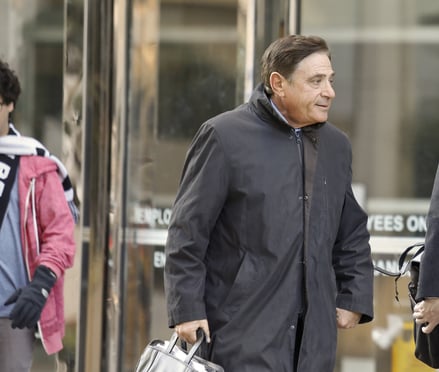Bio-Rad Appeals $11 Million Verdict for Ousted General Counsel
Former Bio-Rad GC Sanford Wadler won a whistleblower suit earlier this year against the company.
October 23, 2017 at 03:28 PM
10 minute read
 Sanford Wadler, former general counsel of Bio-Rad. Photo credit: Jason Doiy/ALM
Sanford Wadler, former general counsel of Bio-Rad. Photo credit: Jason Doiy/ALM Bio-Rad Laboratories Inc. has appealed to the U.S. Court of Appeals for the Ninth Circuit to overturn the $11 million verdict that its former general counsel, Sanford Wadler, won in February in a whistleblower suit.
Wadler filed suit in 2015 following his firing from Bio-Rad. The former GC was fired soon after reporting to Bio-Rad's audit committee that the company may have engaged in bribery in China. A costly internal investigation found no bribery had occurred in the country.
Wadler's attorney, James Wagstaffe, partner and co-founder of Kerr & Wagstaffe in San Francisco, said in an interview Monday, “It is troubling that Bio-Rad wants to appeal this when the matter was resolved and the jury believed Sandy Wadler.”
In its appellate brief filed Oct. 16, Bio-Rad asks the court to overturn the verdict and dismiss the case, or at least to grant a new trial.
The filing cites four alleged trial errors that Bio-Rad claims occurred in the U.S. District Court for the Northern District of California. The 61-page brief, filed by Quinn Emanuel Urquhart & Sullivan partner Kathleen Sullivan, claims:
• No properly instructed jury could have found that Wadler's whistleblowing was protected by the Sarbanes-Oxley Act.
• Wadler failed to prove that he had an “objectively reasonable belief” of bribery or violations of the Foreign Corrupt Practices Act.
• The trial court barred Bio-Rad from presenting two pieces of evidence about Wadler, and these incidents represented “serious evidentiary errors.”
• The Dodd-Frank Act's whistleblowing provision, allowed by the trial court, does not apply to internal reporting.
In an amicus brief filed in support of Wadler at trial, the U.S. Securities and Exchange Commission argued for recognizing retaliation against a whistleblower under Dodd-Frank, even when the allegation is made internally and not to regulators.
The jury sided with Wadler and the SEC, and in February awarded him $2.9 million in back pay and stock compensation, which was doubled under the law, plus $5 million for punitive damages against Bio-Rad. The company also agreed to pay $3.5 million in attorney fees and costs.
Wagstaffe said his brief in response to Bio-Rad “will be very descriptive of what the jury found, that you have to be an honest and in good faith whistleblower, but you don't have to be right.”
He said the jury also found that the company was not telling the truth when it claimed a negative employment review was a “contemporaneous document” used when it fired Wadler. The computer data showed the document was written a month after Wadler left and was post-dated.
“The jury cared a great deal about the fabrication of evidence by Bio-Rad,” Wagstaffe said. “And the jury obviously believed Sandy Wadler was a whistleblower in good faith. That's not something to appeal; that's a finding of fact by the jury.”
 Sanford Wadler, former general counsel of Bio-Rad. Photo credit: Jason Doiy/ALM
Sanford Wadler, former general counsel of Bio-Rad. Photo credit: Jason Doiy/ALM Bio-Rad Laboratories Inc. has appealed to the U.S. Court of Appeals for the Ninth Circuit to overturn the $11 million verdict that its former general counsel, Sanford Wadler, won in February in a whistleblower suit.
Wadler filed suit in 2015 following his firing from Bio-Rad. The former GC was fired soon after reporting to Bio-Rad's audit committee that the company may have engaged in bribery in China. A costly internal investigation found no bribery had occurred in the country.
Wadler's attorney, James Wagstaffe, partner and co-founder of Kerr & Wagstaffe in San Francisco, said in an interview Monday, “It is troubling that Bio-Rad wants to appeal this when the matter was resolved and the jury believed Sandy Wadler.”
In its appellate brief filed Oct. 16, Bio-Rad asks the court to overturn the verdict and dismiss the case, or at least to grant a new trial.
The filing cites four alleged trial errors that Bio-Rad claims occurred in the U.S. District Court for the Northern District of California. The 61-page brief, filed by
• No properly instructed jury could have found that Wadler's whistleblowing was protected by the Sarbanes-Oxley Act.
• Wadler failed to prove that he had an “objectively reasonable belief” of bribery or violations of the Foreign Corrupt Practices Act.
• The trial court barred Bio-Rad from presenting two pieces of evidence about Wadler, and these incidents represented “serious evidentiary errors.”
• The Dodd-Frank Act's whistleblowing provision, allowed by the trial court, does not apply to internal reporting.
In an amicus brief filed in support of Wadler at trial, the U.S. Securities and Exchange Commission argued for recognizing retaliation against a whistleblower under Dodd-Frank, even when the allegation is made internally and not to regulators.
The jury sided with Wadler and the SEC, and in February awarded him $2.9 million in back pay and stock compensation, which was doubled under the law, plus $5 million for punitive damages against Bio-Rad. The company also agreed to pay $3.5 million in attorney fees and costs.
Wagstaffe said his brief in response to Bio-Rad “will be very descriptive of what the jury found, that you have to be an honest and in good faith whistleblower, but you don't have to be right.”
He said the jury also found that the company was not telling the truth when it claimed a negative employment review was a “contemporaneous document” used when it fired Wadler. The computer data showed the document was written a month after Wadler left and was post-dated.
“The jury cared a great deal about the fabrication of evidence by Bio-Rad,” Wagstaffe said. “And the jury obviously believed Sandy Wadler was a whistleblower in good faith. That's not something to appeal; that's a finding of fact by the jury.”
This content has been archived. It is available through our partners, LexisNexis® and Bloomberg Law.
To view this content, please continue to their sites.
Not a Lexis Subscriber?
Subscribe Now
Not a Bloomberg Law Subscriber?
Subscribe Now
NOT FOR REPRINT
© 2025 ALM Global, LLC, All Rights Reserved. Request academic re-use from www.copyright.com. All other uses, submit a request to [email protected]. For more information visit Asset & Logo Licensing.
You Might Like
View All

Collectible Maker Funko Wins Motion to Dismiss Securities Class Action

How Tony West Used Transparency to Reform Uber's Toxic Culture

What Paul Grewal Has Learned About Advocacy as Coinbase's Top Lawyer
7 minute readTrending Stories
- 1California’s New Deepfake Laws: Banning the Deception
- 2MoFo Doubles Down on Private Equity in Asia
- 3The Value of ComFed for New Lawyers (And Not So New Ones)
- 4The 'Nonprofit Killer Bill': Separating Fear From Fact on HR 9495
- 5As U.S. Firms Gain Market Share, Freshfields Maintains Top Spot in European M&A Rankings
Who Got The Work
Michael G. Bongiorno, Andrew Scott Dulberg and Elizabeth E. Driscoll from Wilmer Cutler Pickering Hale and Dorr have stepped in to represent Symbotic Inc., an A.I.-enabled technology platform that focuses on increasing supply chain efficiency, and other defendants in a pending shareholder derivative lawsuit. The case, filed Oct. 2 in Massachusetts District Court by the Brown Law Firm on behalf of Stephen Austen, accuses certain officers and directors of misleading investors in regard to Symbotic's potential for margin growth by failing to disclose that the company was not equipped to timely deploy its systems or manage expenses through project delays. The case, assigned to U.S. District Judge Nathaniel M. Gorton, is 1:24-cv-12522, Austen v. Cohen et al.
Who Got The Work
Edmund Polubinski and Marie Killmond of Davis Polk & Wardwell have entered appearances for data platform software development company MongoDB and other defendants in a pending shareholder derivative lawsuit. The action, filed Oct. 7 in New York Southern District Court by the Brown Law Firm, accuses the company's directors and/or officers of falsely expressing confidence in the company’s restructuring of its sales incentive plan and downplaying the severity of decreases in its upfront commitments. The case is 1:24-cv-07594, Roy v. Ittycheria et al.
Who Got The Work
Amy O. Bruchs and Kurt F. Ellison of Michael Best & Friedrich have entered appearances for Epic Systems Corp. in a pending employment discrimination lawsuit. The suit was filed Sept. 7 in Wisconsin Western District Court by Levine Eisberner LLC and Siri & Glimstad on behalf of a project manager who claims that he was wrongfully terminated after applying for a religious exemption to the defendant's COVID-19 vaccine mandate. The case, assigned to U.S. Magistrate Judge Anita Marie Boor, is 3:24-cv-00630, Secker, Nathan v. Epic Systems Corporation.
Who Got The Work
David X. Sullivan, Thomas J. Finn and Gregory A. Hall from McCarter & English have entered appearances for Sunrun Installation Services in a pending civil rights lawsuit. The complaint was filed Sept. 4 in Connecticut District Court by attorney Robert M. Berke on behalf of former employee George Edward Steins, who was arrested and charged with employing an unregistered home improvement salesperson. The complaint alleges that had Sunrun informed the Connecticut Department of Consumer Protection that the plaintiff's employment had ended in 2017 and that he no longer held Sunrun's home improvement contractor license, he would not have been hit with charges, which were dismissed in May 2024. The case, assigned to U.S. District Judge Jeffrey A. Meyer, is 3:24-cv-01423, Steins v. Sunrun, Inc. et al.
Who Got The Work
Greenberg Traurig shareholder Joshua L. Raskin has entered an appearance for boohoo.com UK Ltd. in a pending patent infringement lawsuit. The suit, filed Sept. 3 in Texas Eastern District Court by Rozier Hardt McDonough on behalf of Alto Dynamics, asserts five patents related to an online shopping platform. The case, assigned to U.S. District Judge Rodney Gilstrap, is 2:24-cv-00719, Alto Dynamics, LLC v. boohoo.com UK Limited.
Featured Firms
Law Offices of Gary Martin Hays & Associates, P.C.
(470) 294-1674
Law Offices of Mark E. Salomone
(857) 444-6468
Smith & Hassler
(713) 739-1250






